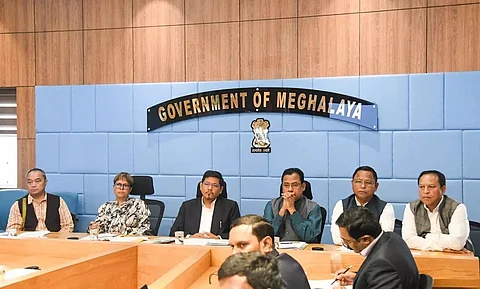
- Home
- Live Blog
- Breaking News
- Top Headlines
- Cities
- NE News
- Sentinel Media
- Sports
- Education
- Jobs

Shillong: In response to the alarming rise in HIV/AIDS cases, the Meghalaya government is considering introducing a law to make HIV/AIDS testing compulsory before marriage, Health Minister Ampareen Lyngdoh announced on Friday.
Citing the state's growing burden of infections, Lyngdoh said Meghalaya currently ranks sixth nationally in terms of HIV/AIDS prevalence, with the northeastern region being one of the most affected. “If Goa has made testing compulsory, why shouldn't Meghalaya have its own set of laws? These laws would benefit the larger community,” she told reporters. The announcement followed a high-level meeting chaired by Deputy Chief Minister Prestone Tynsong, and attended by Social Welfare Minister Paul Lyngdoh and eight MLAs from East Khasi Hills, aimed at formulating a comprehensive HIV/AIDS policy under a mission-mode approach.
Lyngdoh said the Health Department has been instructed to draft a cabinet note for the proposed policy. The government also plans to hold similar consultation meetings in the Garo Hills and Jaintia Hills regions to develop area-specific strategies in collaboration with bureaucrats and medical professionals. The minister revealed worrying statistics: East Khasi Hills district alone has recorded 3,432 HIV/AIDS cases, but only 1,581 patients are receiving treatment. “The highest number of cases in the state, however, are being reported from the Jaintia Hills region, both East and West,” she said. She further expressed concern over 159 reported deaths in the district due to interrupted Antiretroviral Therapy (ART). “HIV/AIDS is not fatal if treated properly, just like cancer or TB. We must ensure that all who are tested are brought under treatment,” she emphasized.
While awareness levels in the state have improved, Lyngdoh said the main challenges now lie in increasing testing and screening, especially as the primary mode of transmission is sexual contact. Injecting drug use has not yet emerged as a dominant factor, she added, citing difficulties in identifying users.
The policy, once formalised, is expected to mark a significant shift in Meghalaya's public health approach, combining legislation with community-level interventions to curb the spread of HIV/AIDS.